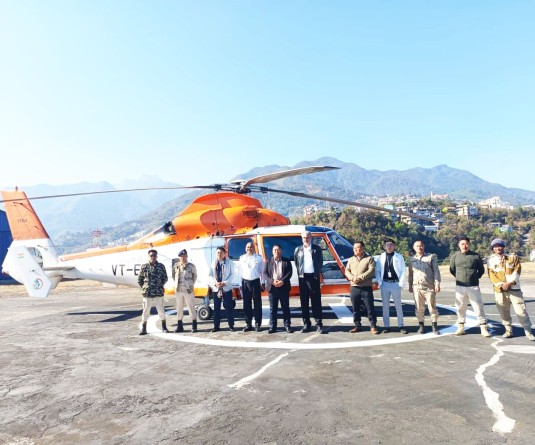
Dimapur, April 19 (MExN): The Naga Students’ Federation (NSF) and the Naga Scholars’ Association (NSA) and Zuketsa Area Public Organisation (ZAPO) have denounced the reported “arbitrary travel denial” of Neingulo Krome by the Indian Government.
Krome, Secretary General of the Naga Peoples’ Movement for Human Rights (NPMHR), was prevented from travelling to Kathmandu from Indira Gandhi International Airport (IGI), New Delhi, to attend a meeting organised by the Asia Indigenous Peoples Pact (AIPP) on April 7.
NSF: In a press statement, the NSF stated that the ‘detainment’ at the IGI was not an isolated incident. In 2020, he was similarly stopped at Kolkata Airport while en route to Bangkok.
“On both occasions, the Indian authorities could offer nothing more than a vague and authoritarian, ‘You cannot travel,’—a response that blatantly violates national and international law,” the Federation maintained.
The NSF also pointed out that the right to travel is a fundamental human right, enshrined in Article 13.2 of the Universal Declaration of Human Rights and protected under Article 21 of the Indian Constitution.
It is a settled position of the Indian Supreme Court that any curtailment of this right must be lawful, justified, and supported by due process, it said.
Thus, the Federation deemed the denial of the right to Krome without ‘explanation or recourse’ as not only an affront to him but also to the “principles of democracy and justice that the Indian State claims to uphold.”
The NSF also stated that it was “deeply disturbed” by what it maintained as the continuation of the Indian State’s decades-long “campaign to silence indigenous Naga voices under the guise of national security and integration.”
The most recent treatment of the NPMHR General Secretary is “emblematic of the systemic oppression faced by the Naga people—denied freedom of movement, fenced off from kin across borders, and subjected to draconian laws that perpetuate fear and subjugation,” it added.
“Such actions are not just violations of individual liberty, but a calculated attempt to erase Naga identity and suppress their rightful aspirations for dignity and self-determination,” it added.
To this end, it urged the Government of India to “immediately restore Krome’s travel rights, issue an official explanation, and put an end to this unlawful harassment.”
The NSF also conveyed its unwavering solidarity with Krome and all indigenous peoples fighting for justice and asserted that it would not remain silent in the face of oppression.
“We reaffirm our commitment to defending the rights and dignity of the Naga people, both within and beyond our ancestral homeland,” it added.
The NSF also urged international bodies like the UNPFII and UNPO to hold India accountable for violating its commitments under UNDRIP and the UDHR.
NSA: Meanwhile, noting that it is not an isolated incident, the NSA called the April 7 incident part of a “disturbing pattern of targeted harassment and obstruction” that Krome has faced time and again over the years from successive governments.
The Association also highlighted that Krome is a respected public figure and long-time advocate for peace, justice, and the rights of indigenous communities, and has consistently stood for democratic values, truth, and the enlargement of democratic space and platforms for all people.
The repeated attempts to disrupt his movements—through airport detentions, unexplained surveillance, or bureaucratic hindrances—are a clear violation of the fundamental rights guaranteed to every individual under any democratic country, the NSA held.
It termed the denial of travel not just an affront to one individual but emblematic of a “deeper malaise—a state machinery increasingly insecure in the face of dissent and diversity.”
The NSA thus termed the action as the “normalisation of repression, where the freedom of citizens is trampled upon with bureaucratic ease and political intent,” and the unwillingness to tolerate alternative voices.
It also recalled that Krome has previously been allegedly harassed by government agencies, including unwarranted questioning, disruptions to his professional engagements, and surveillance intended to intimidate.
“The present incident is merely a continuation of a troubling tradition of state overreach,” it maintained, and called upon all democratic institutions, civil society organisations, and conscientious citizens to “speak out against this blatant misuse of power.”
ZAPO: The ZAPO expressed dismay and concern over the incident, calling it an “unlawful act” that not only violates the Fundamental Rights enshrined in the Constitution of India but also “amounts to suppressing the voice of indigenous people around the world.”
It categorically stated that Krome is a bona fide, law-abiding citizen of India and has not committed any offence. The act of preventing him from travelling abroad and his illegal detention without any valid reason constitutes a gross violation of Article 13 of the Universal Declaration of Human Rights (UDHR), 1948. Paragraph 2 of Article 13 states: “Everyone has the right to leave any country, including his own, and to return to his country” and India, being a signatory to the UDHR, is thereby denying its citizens their human rights, it added.
Accordingly, the ZAPO condemned the unwarranted act imposed upon one of its respected members, who has been tirelessly working for the promotion of universally recognised and accepted human rights, by the Government of India.





